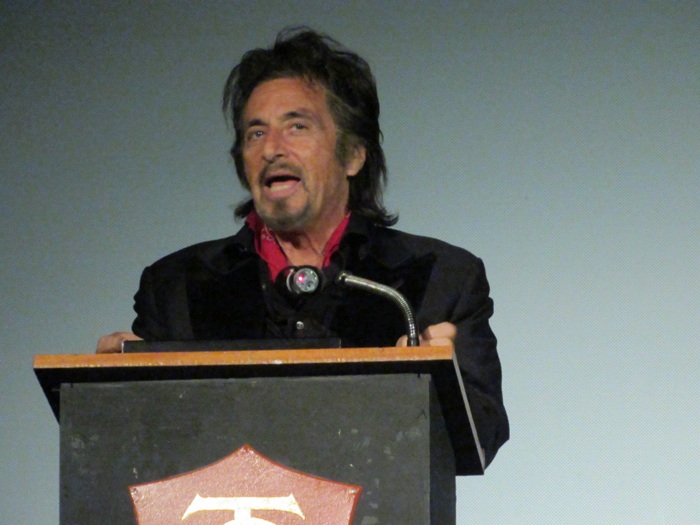All my amigo Morlock E. wants to know is where Frank Chu is, since Frank Chu is still a fairly good indicator of being at the most happening event of the evening — or at any rate the one with the most television cameras. But instead of Frank, all we see is a crush of autograph seekers pressed against the velvet rope separating them from the red carpet unfurled outside the Castro Theatre. They’re not here to see Frank Chu, and in truth, neither are we. We’re here to get a photo of Al Pacino and maybe touch the hem of his cloak, at the US premiere of his latest project, a documentary entitled Wilde Salome.
Since it’s not every day San Francisco gets to play host to a big premiere, the Wed/21 turnout is robust, convivial. Also a fundraiser for the GLBT Historical Society — there are some quite dapper dandies in attendance, an element one feels certain Wilde would have approved of. But one gets the impression that the autograph-hounds are less enamored with the Wildean aspect of the event rather than the chance to shake the hand of Scarface, but Wilde, with his penchant for “rough trade” might well have approved of that too.
Morlock perks up when a gigantic luxury mobile pulls up and disgorges a gaggle of socialites onto the red carpet. “Are they escorts?” he demands to know. He indicates the license plate, ESCORT1 as proof, but attempting to explain custom business plates to contrarians is really a wasted effort, so I let it go as the ladies line up against a somewhat unimpressive backdrop of sponsorship logos and dimple cutely for the cameras. In truth, it’s the mechanics of events like these that interest me most, everyone doggedly intent on playing their respective roles, from the principles to the sycophants.
Morlock’s base improv is a small wrench in the smoothly-rehearsed order of things, but fortunately we don’t have much longer to wait. Another sleek black vehicle rolls up and Pacino rolls out. And like the red sea caving back in on top of the Egyptians, the orderly crowd becomes a desperate, notebook-waving mob. Expertly hustled through the throng, Pacino poses quickly against the backdrop before being swept inside by security. And there, in his scattered wake, we finally spot Frank Chu. It’s always good to see a familiar face.
It’s been 130 years since Oscar Wilde was himself in San Francisco — March 26, 1882 to be precise — and close to 30 years since Pacino played The Curran Theatre as Teach in David Mamet’s “American Buffalo,” but in Pacino’s good-humored introductory speech, he expressed his fondness for his San Francisco days, appropriately framed against a similarly complimentary Oscar Wilde quote about our torrid Babylon.
In the vein of Looking for Richard, Wilde Salome began as a personal project of Pacino’s, who admits to having made several such documentaries in the past, though Richard is the only one that he’s ever released—until now. Tracing the circuitous path of a method actor in search of not just his character but also the motivations of that character’s creator, Wilde Salome is partly an exploration of Oscar Wilde’s most controversial play “Salome,” and partly an exploration of the man himself. Filmed in part during a run of Oscar Wilde’s “Salome,” at the Wadsworth theatre in LA, in which Pacino played King Herod, and in part in the company of “experts,” (Gore Vidal, Tom Stoppard, Tony Kushner, and Bono to name a few) fleshing out the historical details of Oscar Wilde’s life, the action unfolds in a series of non-chronological scenes with Pacino as the thread connecting them together.
Opening with the line “this is a story about an obsession” the film proceeds to delve into about a dozen: Pacino’s obsession with both his portrayal of Herod and Wilde, Wilde’s obsession with his boorish lover “Bosie” (Lord Alfred Douglas), Herod’s obsession with his step-daughter Salome, Salome’s obsession with the prophet Jokanaan, Film Producer Barry Navidi’s obsession with their tight shooting schedule, and even each individual actor’s quirky backstage rituals. In one scene, Pacino throws a party, in order to instill the impression of a raucous banquet gone too far in the actors, and especially in Jessica Chastain, whose intoxicatingly toxic portrayal as Salome speaks volumes on “the destructive power of sexuality,” a Wildean parallel.
In fact, if the movie has a sleeper star it is certainly Chastain, whose actor’s instincts appear as sharply honed as those of any of her older co-stars, and her wrathful dance of the seven veils reads as practically a throwdown challenge to the old guard. Herod’s certainly. And maybe even Pacino’s. Though seeing Pacino graciously holding court at the Castro did give the impression that he’s got a few years in him before he’ll have to worry about being summarily dethroned.

